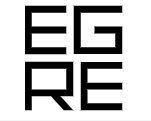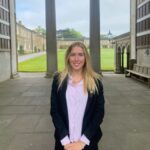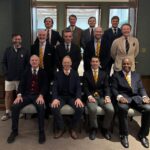The Haileybury Society is saddened to learn of the death in South Africa of Nick Downie (A 59), who has died from a Covid-related illness on May 12th, aged 74.
After Haileybury, Nick studied medicine at Middlesex Hospital from 1964-68, only to find that hospital life did not hold much interest for him; a condition not helped by sudden blackouts, when he would fall asleep unpredictably. Consequently, in his final year of medical school, he dropped out and applied to join the SAS. The sole civilian candidate out of 120 that year, he was one of only seven who passed the gruelling selection course.

Guerrilla warfare
Nick’s particular interest was in guerrilla warfare; his time in the SAS and later as a professional soldier certainly satisfied him. Spending over three years with the SAS, he was involved in suppressing communist insurgents in Oman, a crucial British ally in the region.
It was during this time that he left professional service to become a contract mercenary, continuing to fight alongside Bedouins in Oman from 1972 to 1974, where the actions of himself and his fellow soldiers earned great respect from Sultan Qaboos. Later, following disillusionment with British military command, he was then to fight in with the Kurdish Peshmerga during the Second Iraqi – Kurdish War (1974-75).
Camera, Action!
It was the skills Nick developed during these years which were fundamental to his later work as a combat cameraman. Indeed, he took with him on these excursions a small clockwork camera – a task in itself not that easy considering the 90lb+ of medical and military kit and equipment he and his fellow soldiers also had to carry.
As the medic in the group, he was often drawn to the very centre of the action; it was Nick’s short clip of Peshmerga guerrillas in action which earned him £60 from the BBC and launched his career as a freelance cameraman. His first real breakthrough was in 1975 when, with Gwynne Roberts, he walked from Sudan to Asmara to cover the Eritrean War, the results of which were aired on Thames Television.
Courting controversy
The life of a lone cameraman, however, was not without difficulty. Nick’s union card stated that he was allowed to work on hazardous assignments, allowing him to work without union back up in combat zones and similar locations. However, proving which of his assignments were genuinely hazardous was often a point of contention.
In 1980, his union, the ACTT (the Association of Cinematograph, Television and Allied Technicians), wanted to prohibit a report he made of Afghan rebels immediately prior to the notorious Russian intervention. The film, the making of which involved Nick shooting with a group of Mujahideen fighters under ten days of intensive mortar bombardment, was only aired on Thames in 1980 after it was deemed having been filmed in genuinely hazardous conditions. While Afghanistan: with the rebels was to win a Royal Television Society award, another documentary on the Vietnamese boat people was never shown due to union pressure.
Nick Downie – career awards
Nick’s fearless style was to earn him other career awards, including another RTS award for a film shot about the war between the Polisario Front and the Kingdom of Morocco; a film which included some graphic front line coverage of the horrors of war. His TV Eye documentary on the bush war in Southern Rhodesia (now Zimbabwe), which foresaw some of the horrors of the later Mugabe years, was equally not without its own horror; Lord Richard Cecil, the freelance journalist accompanying him, was shot and killed at close range by one of Mugabe’s soldiers. He was most proud of the Channel 4 series Survive (1985), a series broadcast on Channel 4 in 1985, in which he demonstrated the art of survival in extreme situations such as extreme cold or under torture.
Nick Downie – dead or alive?
Working in such a hazardous field, rumours of Nick’s death often followed him around. In the early 2000s, for example, one OH was in contact with the Society to tell us that he thought Nick had died in a canoeing accident in Nepal. Indeed, in 1993, no less an authority than the Daily Telegraph reported he had been killed in Afghanistan. Nick’s reply was typical:
“I have no wish to appear a pedant … [but] for the benefit of my friends, colleagues and erstwhile comrades-in-arms (not to mention the Inland Revenue and my somewhat startled 80-year-old mother) I would like to make it clear that I survived all my visits to that country and am living peaceably in Sussex with my two young daughters.”
No time for poseurs
Those who fight in wars and see its horrors are so often furthest away from the pretence and artifice of civilian life. In a memoir reflecting on his career and his final “retirement” from hazardous camerawork in the 1990s, he wrote,
“One of the things that drove me was a fascination with the people to be found in the front line. The closer to the killing ground that you get, the more the layers of pretence are peeled away, until all that is left is naked, raw character. The wannabees, the poseurs, the bombasts have all found an excuse and left. Those that remain are among the most admirable individuals I’ve ever met – quiet-spoken, friendly, and sometimes fantastically brave.”
In a world so often still populated by such wannabees and wafflers, Nick’s reflections have a powerful resonance and compel us to look within ourselves at who we really are and those we truly value.

(Above: no time for poseurs – Nick on the front line with his camera)
Nick married Hilary Payne in 1977, a marriage which lasted until 1992. He is survived by their two daughters, to whom the Haileybury Society sends its deepest condolences.
The Haileybury Society is grateful to the Daily Telegraph for the information on Nick’s life, and for the photographs contained within this report
More from The Haileybury Society
- EGRE – international Boutique Real estate Agency

- Running In Memory: Annabelle Smith (M 22) Takes on the Cambridge Half for Mind

- HYT Uganda Update: A Lanmark Year of Groth, Innovation, and Impact

- £500 Travel Grant Awarded for Clinical Placement in Peru – Emily Jacobs (M13)

- World Champions & OHs Take to the Court at Queen’s

- Design, Politics and Discovery: A Solo Journey Across Europe

Unless otherwise stated, all content and images on this website and blog © The Haileybury Society, 2024, all rights reserved
Search stories by date
Unless otherwise stated, all content and images on this website and blog © The Haileybury Society, 2024, all rights reserved